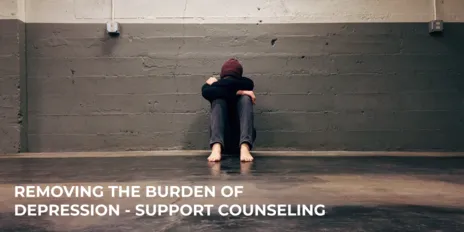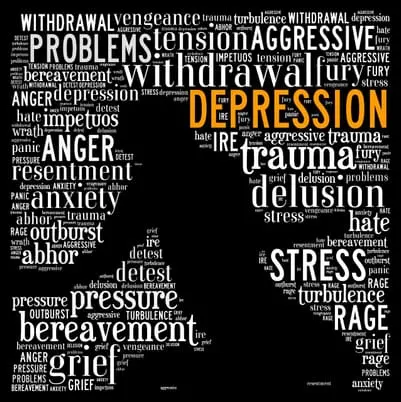Has Depression Left You Feeling Stuck And Hopeless?
- Have you become disengaged from the activities you once received inspiration and enjoyment from?
- Is depression negatively impacting your close relationships, causing further withdrawal, isolation, and sadness?
- Do you beat yourself up when you struggle to snap out of it on your own, which only heightens your sense of hopelessness?
When depression takes hold, it might feel like you’re wading through quicksand just to get through the day. Lacking energy and motivation to complete even the most basic tasks, such as self-care, can exacerbate a sense of h apathy. Sadly, the longer depression persists, the harder it becomes to pull out of its dark hole and return to normal.
Your Thoughts, Habits, And Behaviors May Have Changed
You may experience changes in your diet and sleeping habits, such as eating more or less than usual or suffering from either insomnia—too little sleep—or hypersomnia—too much sleep. Lack of quality rest and good nutrition could affect your concentration, memory, and alertness.
If your low mood causes you to feel irritable, deeply sad, or emotionally numb, it could make your interactions with loved ones challenging. Perhaps you actively avoid others rather than risk having them see you this way. And if thoughts of suicide come and go, you might be afraid of what may happen if things don’t change.
As despondent as you may feel, therapy for depression makes it possible to shift your energy and the trajectory of your story. Speaking to an empathetic and compassionate professional about whatever is troubling you can be validating and transformative.
Kentucky Has An Above Average Rate Of Depression
According to the US Centers for Disease Control and Prevention, depression affects an estimated 4.7 percent of adults over 18 on average. [1] What’s more, rates of depression vary depending on geographic location. Unfortunately, hovering at roughly 24 percent, Kentucky has the second-highest rate of depression in the country. [2] [3]
The culprits for an excess depression in our community include:
- The large population that lives near—or below—the poverty line;
- Chronic health conditions;
- Anti-LGBTQ sentiment;
- Limited resources and support for families;
- Domestic violence or other abuse;
- Lack of access to social activities, and;
- Career burnout.
In fact, research has concluded that life stressors can “change gene expression in the brain, leading to altered depressive-like behavior.” [4]. When these factors interact to worsen each other, it can make depression a difficult loop to escape.
We May Resist Getting Long-Term Help
In some instances, we may be unable to pinpoint a reason for depression, in which case we may blame ourselves for our low mood as if we don’t have a right to our feelings. Because depression steals our motivation and convinces us the world is darker than it really is, overcoming it alone can be especially difficult. The inertia depression creates can make us crave quick fixes.
For example, we may want to take medication without exploring the underlying reasons why we are depressed. Alternatively, we may resist seeking viable solutions that could help address depression—such as anti-depressants or holistic therapy—due to outdated stigmas surrounding wellness and mental health care.
Regardless of what underlies your depression, our goal is to equip you with tools to reduce symptoms as you navigate a path forward. If you feel ready to tackle depression and set a course for a healthier journey, depression counseling offers hope. Changing your narrative can help you create a more positive and authentic version of yourself.
Depression Therapy Offers Hope
If depression has shut you down, it’s easy to forget that you’re far more capable of shifting your perspective than you may realize. Remember that any progress is progress. If you begin counseling rating your level of depression as a 10 out of 10 and by your following session, it has dropped to a 9 out of 10, that is progress. Removing expectations of how quickly recovery will take allows you to be patient with yourself and celebrate the wins, no matter how seemingly small they may be.
In therapy, you will explore the triggers of depression and receive support in finding new thinking patterns, implementing effective coping strategies, addressing the source of the issue, and getting back to a life you love. Because we work with couples and families, therapy can also be beneficial in exploring the impacts of depression on these relationships and identifying ways to improve dynamics. Most importantly, we tailor our tools and approaches to your needs. Receiving your feedback throughout therapy is vital to creating a plan for treating depression that works best for you.
What To Expect In Sessions
In our practice, we allow our clients to define what the long-term goal of therapy will be. Depression often includes rebuilding a meaningful lifestyle that is entirely unique to you. Throughout therapy, we will explore what that life looks like and tackle obstacles—or build tools—to support you in creating the life you want.
The guiding principle of our practice is that no one knows your life better than you. After all, you live it every day. You have likely developed your own workarounds to manage your symptoms and experienced varying degrees of success with them. Rather than start from scratch, we can determine what has worked well previously and build upon that. In addition, we will recommend other beneficial strategies based on your expertise and feedback. Our goal is to equip you with the tools you need to manage your depression so that, eventually, you no longer need us
The Modalities We Offer In Depression Counseling
For treating depression, our therapists blend a myriad of tools and modalities, including Cognitive Behavioral Therapy (CBT), Dialectical Behavior Therapy (DBT), and Acceptance and Commitment Therapy (ACT). We also offer reiki, tapping, and physical movement to help you gently connect with your body.
With a solution-focused approach to treatment, you can learn how to shift your thinking and perspective to more helpful and less limiting styles, regulate intense emotions, and develop greater acceptance of things that are out of your control. By setting yourself in motion each day—even if it’s just opening the drapes—and pursuing choices and activities you care about, you can nudge the muscle memory of how it feels to resume life on your own terms.
Therapy will teach you how to befriend and tend to your depression rather than being swallowed whole by it. Once you shift your current dynamic, space opens to reengage with life and experience meaningful moments again.
But Maybe You’re Not Sure If Depression Therapy Is Right For You…
Is depression counseling really necessary? Shouldn’t I be able to pull out of this myself?
When depression settles in over your life, it’s easy to lose perspective. That’s why receiving fresh insight from an unbiased and nonjudgmental therapist can be beneficial. Working with a supportive counselor trained in the most effective evidence-based depression therapies can help validate your experience and collaborate with you to customize the best treatment. If life is too hectic during the work week, we encourage you to take advantage of our afternoon, evening, and weekend appointments.
In addition to treatment, will I have to take medication for depression?
Whether or not you decide to take anti-depressants is entirely up to you. We will work with you as a collaborative partner, reviewing the benefits and risks of medication so you can make an informed decision. If you determine medication is not for you, that is perfectly okay. We will then focus on exploring helpful therapeutic tools, resources, and evidence-based approaches that can improve your outlook and remind you of what you are capable of.
I feel so screwed up and lost—will depression therapy be able to help me?
If you are ready to find solutions to depression, we are here to support you. While ten percent of change starts with depression treatment, ninety percent is done outside of counseling sessions. Your feedback guides us each step of the way to ensure we tailor a road map to best assist you. And remember that any modifications you make are a sign of incremental progress. There is no set pace or timeline you must achieve outside of what feels doable to you.
You Are More Resilient Than You Think
Don’t allow depression to derail you from the life you love. If you would like to find out more about individual, family, or group depression therapy with Scottsville Counseling Center, you may visit our contact page or call 270-943-7818 to schedule a free 15-minute call to get more information.
[1] https://www.cdc.gov/nchs/fasta...
[2] https://www.cnn.com/2023/06/15...
[3] https://cidev.uky.edu/kentucky...
[4] https://www.ncbi.nlm.nih.gov/p...





